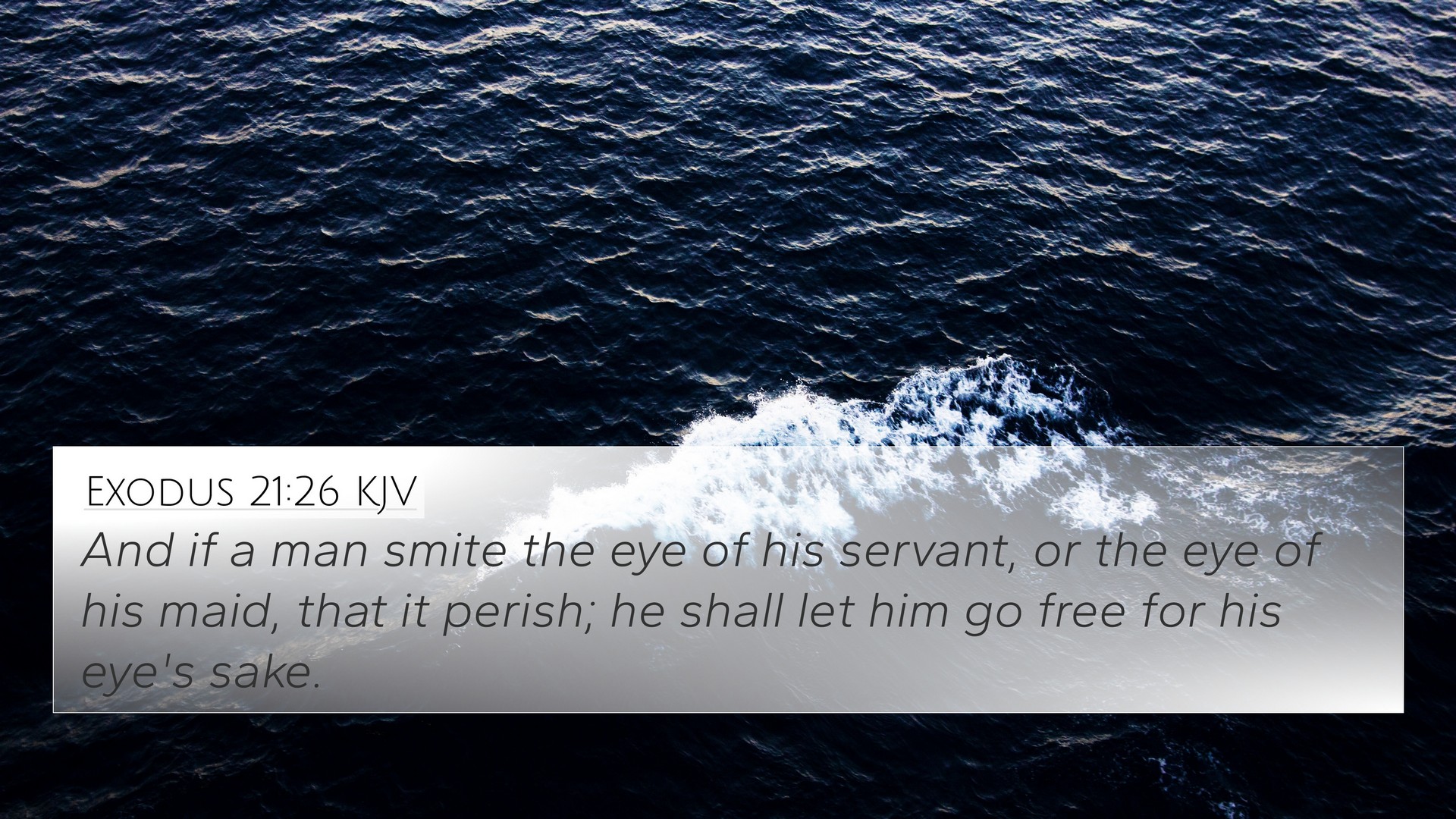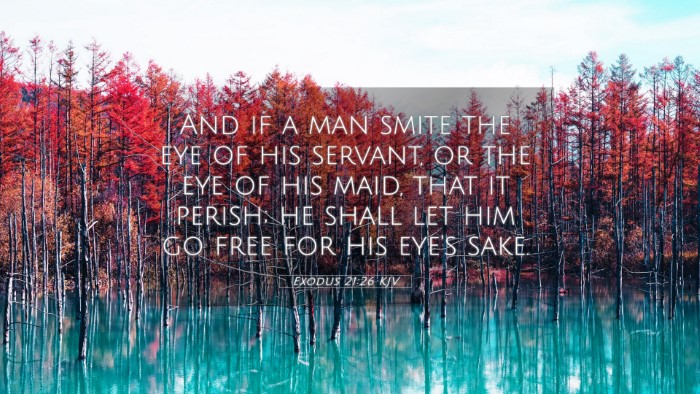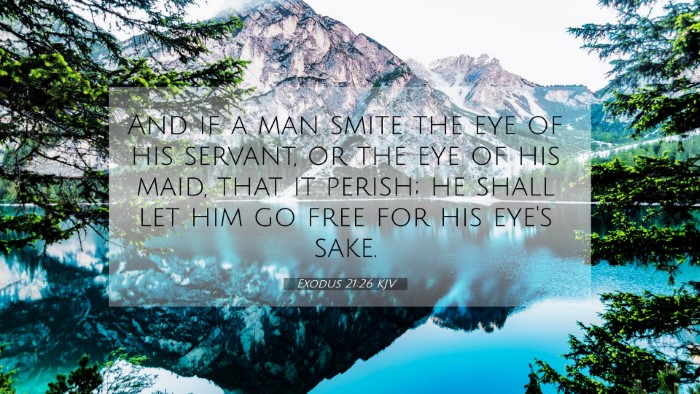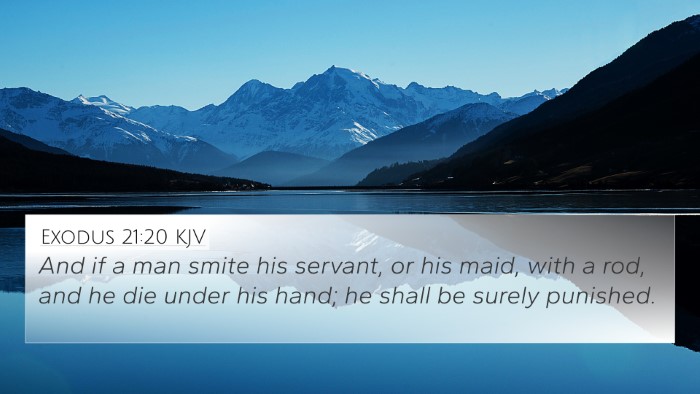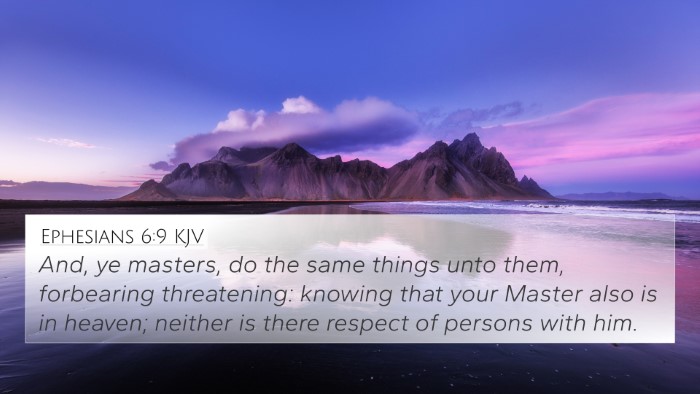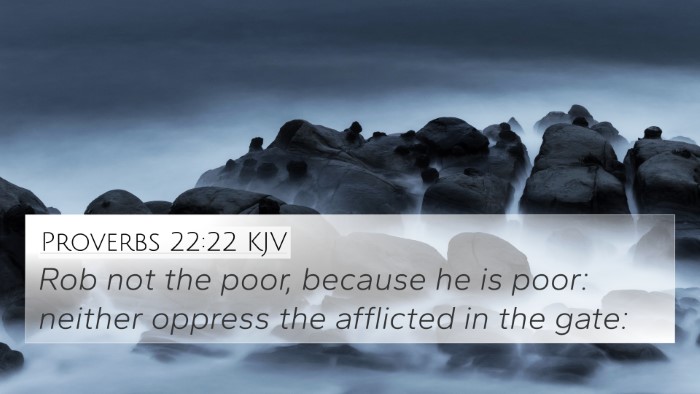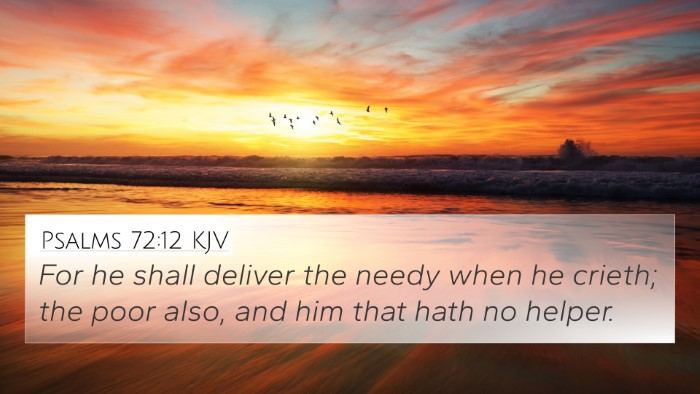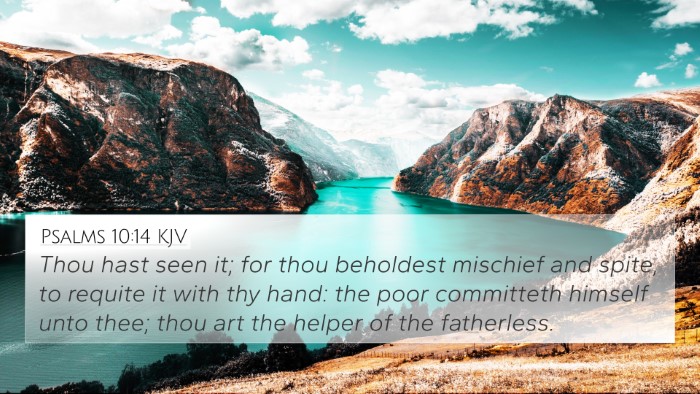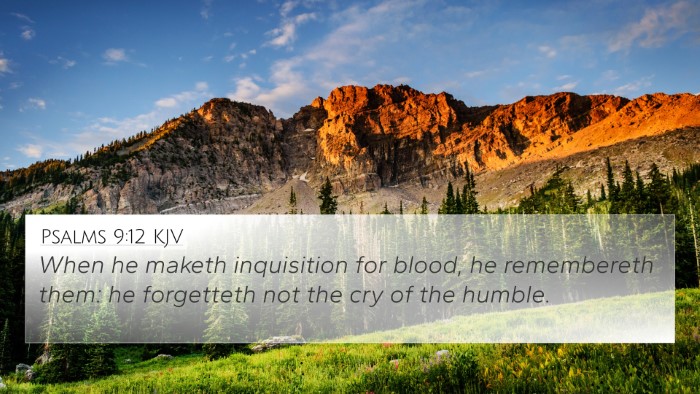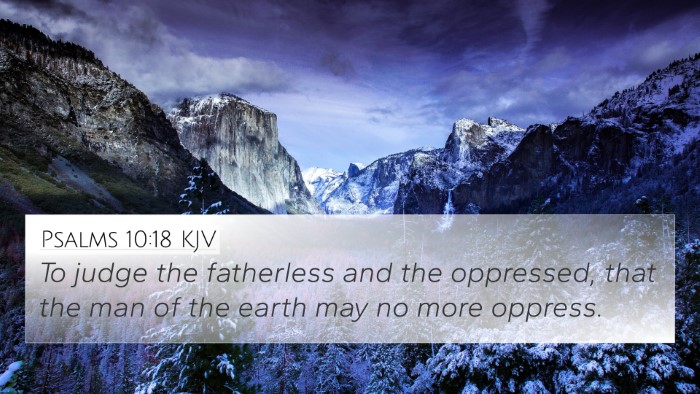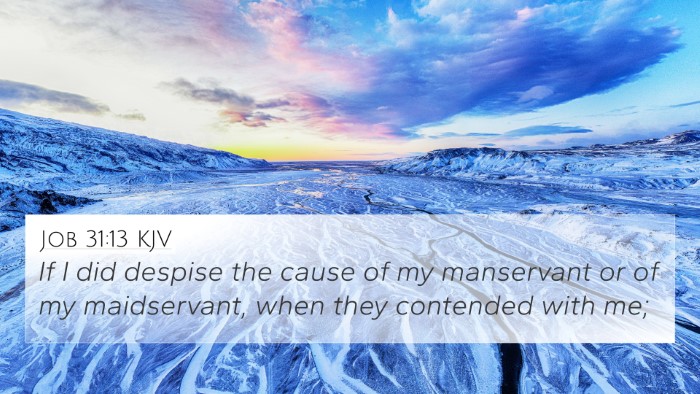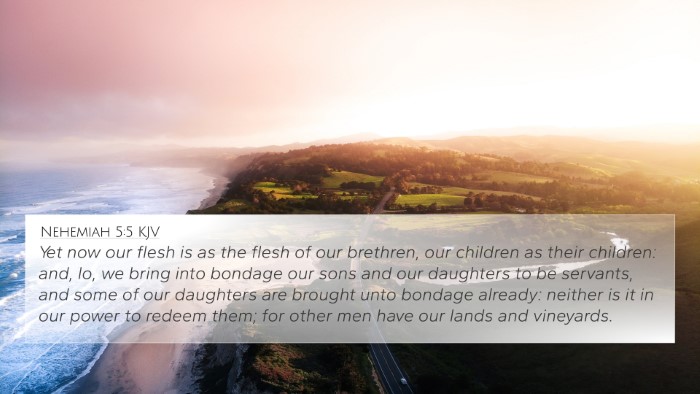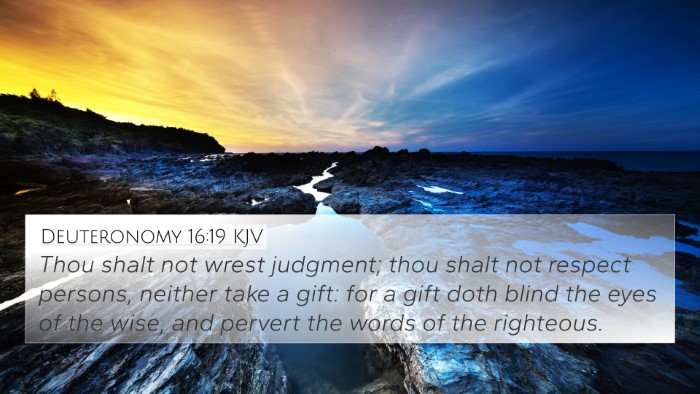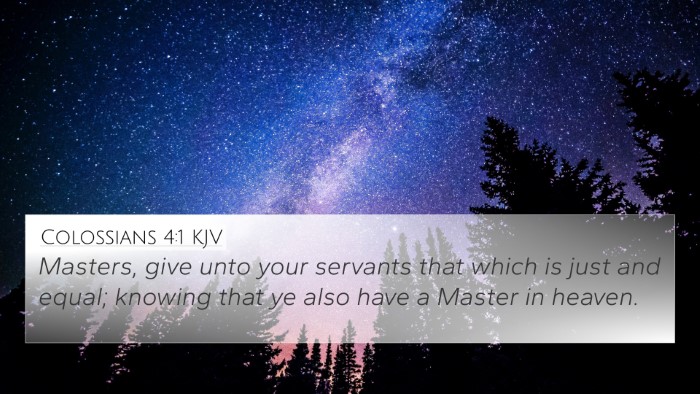Understanding Exodus 21:26
Bible Verse: Exodus 21:26
Verse: "If a man strikes the eye of his male or female servant and destroys it, he shall let him go free because of his eye."
Overview of Exodus 21:26
This verse is part of the broader legislative context found in Exodus 21, which outlines laws given to Israel concerning servitude and personal injury. It establishes the principle that injurious acts have consequences and offers a form of protection for servants.
Commentary Insights
This section summarizes insights from various public domain commentaries regarding Exodus 21:26, including those by Matthew Henry, Albert Barnes, and Adam Clarke.
-
Matthew Henry:
Henry emphasizes the moral imperative of justice in this law. He points out that the striking of a servant's eye not only inflicts harm but also undermines their dignity and autonomy. The compensation mandated—freedom—serves as a warning against the mistreatment of those under one's authority. The principle reflects God's concern for the vulnerable and serves as a reminder of the inherent value and rights of every person.
-
Albert Barnes:
Barnes highlights the societal implications of this law. He notes that the stipulation to free the servant if injured mirrors the concept of accountability among employers and employees. Barnes ties the notion of physical harm to broader themes of justice in the Scriptures, reinforcing the idea that God is a God of order and fairness. He also draws connections to how this principle exemplifies love and care, particularly within household dynamics.
-
Adam Clarke:
Clarke elaborates on the punitive and restorative aspects of this law. He explains that the law serves both as a punitive measure against the master who harms the servant and as an act of restoration for the injured. Clarke discusses how this framing reflects God’s desire for humane treatment within society and serves as a guide for ethical behavior among people of faith.
Thematic Connections
Exodus 21:26 connects with several themes and verses across the scriptures, illustrating God's principles of justice and mercy.
- Justice and Accountability:
- Leviticus 24:20: "Fracture for fracture, eye for eye, tooth for tooth..." - Emphasizes the law of retaliation as fairness in justice.
- Matthew 7:2: "For with the judgment you pronounce you will be judged..." - Highlights the importance of being accountable for one's actions.
- Protection of the Vulnerable:
- Proverbs 31:8-9: "Speak up for those who cannot speak for themselves..." - Advocates for the protection of those who are oppressed.
- James 5:4: "The wages of the laborers who mowed your fields, which you kept back by fraud, cries out..." - Addresses the exploitation of workers.
- Spiritual Freedom:
- Galatians 5:1: "It is for freedom that Christ has set us free..." - Builds on the theme of liberation from bondage, not only in a physical sense but spiritually as well.
- John 8:36: "So if the Son sets you free, you will be free indeed." - Emphasizes the freedom provided through Christ as a universal principle applicable to all.
Cross-Referencing Related Verses
The act of cross-referencing Bible verses surrounding Exodus 21:26 reveals a rich inter-Biblical dialogue. Here are some significant verses to consider:
- Exodus 21:20: Establishes principles of punishment for harm caused to servants, setting the stage for Exodus 21:26.
- 1 Timothy 6:1: Addresses the treatment of servants and the expectation of godliness in all relationships.
- Colossians 4:1: "Masters, treat your bondservants justly and fairly..." - Further guidance on interpersonal relationships in service contexts.
- Deuteronomy 15:12: Discusses the release of Hebrew slaves in the seventh year, paralleling the theme of freedom upheld in Exodus 21:26.
- Matthew 10:29: "Are not two sparrows sold for a penny? And not one of them will fall to the ground apart from your Father." - Speaks to God’s care for even the least valuable among us.
- Luke 16:10: The call for faithful stewardship and ethical behavior in all dealings reflects the principles found in Exodus.
- Psalms 146:7: "He executes justice for the oppressed; He gives food to the hungry." - Affirms God’s advocacy for the marginalized.
Practical Application and Reflection
Exodus 21:26 challenges us to reflect deeply on our treatment of others, especially those in subordinate positions. As we study this verse, we are reminded of a few key points:
- Justice: Upholding justice in personal interactions and recognizing the weight of our actions.
- Compassion: Offering grace and compassion to those who work for us, remembering their humanity.
- Responsibility: Being accountable for our actions and understanding their impact on those around us.
Conclusion
In summary, Exodus 21:26 not only speaks to the legal framework of ancient Israel but also echoes through time, affirming humanity’s call to justice and compassion. By engaging with this and related verses through cross-referencing, we enrich our understanding of how God's principles of love and justice are woven throughout the fabric of scripture.
Tools for Further Bible Study
For those eager to explore more about cross-referencing and linking bible scriptures, consider utilizing various resources including a Bible concordance, cross-reference guide, or comprehensive materials dedicated to Bible verse analysis. These tools can enhance your study and understanding of the connections between Bible verses.
